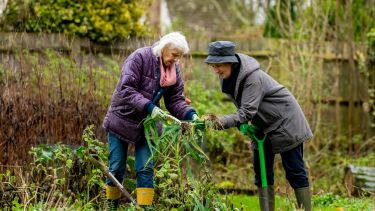Building Stronger Communities research programme
In 2022 the University of Sheffield awarded £1,000 each to 16 charities and organisations across the region who support people and address issues in local communities.

The University of Sheffield and South Yorkshire Community Foundation (SYCF) collaboration combines the University's work in sustainability and social inclusion with findings from SYCF's Vital Signs Report, highlighting the priorities that need addressing in local communities to increase the strength, resilience and growth of the region.
SYCF invited charities and community organisations, already doing work linked to the key priorities, to apply for feasibility funding to explore a project further. They were required to demonstrate how the project would bring benefit to their organisation by working with either a University academic or research group. Of the applications received, 16 were granted feasibility funding and a further three received informal support from an academic.
The initial £16,000 funding supported the charities to partner with an academic to conduct a feasibility study into projects aimed at addressing a pressing need in their community, covering areas such as crime and safety, mental health, employability, and poverty and disadvantage.
A panel composed of members from the University of Sheffield and SYCF then assessed each study to determine which organisations would progress to the next round of funding.
Following the panel, a total of £45,000 was awarded to five charities across South Yorkshire. The grant - part of the University's Made Together 'Building Stronger Communities Fund' - is split over two years, with allocation support from SYCF.
The five charities that were awarded £9,000 each are:
- Affinity 2020, Rotherham
-
Dr Jessica Langston from the Department of Sociological Studies is working with Affinity 2020 to provide support to young people in Rotherham and wider South Yorkshire who have been in the care system. The project aims to understand the barriers and challenges young people who have experienced care face when getting into employment and provide education to reduce stigma.
This includes provisions such as providing resources and training, raising awareness and eradicating misconceptions about being care-experienced in the workplace. It will also look into how social care systems can affect the employment process, creating pathways to change the futures of young people who have experienced care.
- Clifton Learning Partnership, Rotherham
-
Ryan Powell and colleagues at the Department of Urban Studies and Planning are working with the charity to provide community support and services to deal with complex vulnerabilities, exploitation, unemployment, poverty, and inequality.
The project will create a monitoring and evaluation framework that will help the partnership collect data and evidence the impact of their work. This aims to contribute to neighbourhood cohesion and foster positive community relations, as well as make their work more sustainable, such as supporting them in future access to funding.
- DIAL Barnsley
-
Dr Kirsty Liddiard from the School of Education is working with DIAL to provide support for their service users to help combat poverty and disadvantage. DIAL is a user-led organisation that provides free information, advice and support to disabled people, their families and carers to address poverty and social exclusion in Barnsley.
The project aims to develop an app-based tool to support people to complete benefit claim forms for Personal Independence Payment, including tips and guidance for making a successful claim. Through the tool, DIAL aims to reach more clients in a time of limited funding and resources, empower those they support and make an app that can be further developed to include other DWP benefits.
- Educational Learning Support Hub, Barnsley
-
Professor Majella Kilkey (Department of Sociological Studies) and Dr Sabine Little (School of Education) are supporting Barnsley’s mental health provision by working with local charity Educational Learning Support Hub (ELSH). ELSH specialise in providing asylum seekers, refugees and migrant people access to free support and learning to enable them to achieve their potential, become independent and successfully integrate into the local community.
The project will support ELSH to develop a programme of activities which will complement the charity’s wider educational workshops and initiatives, increase the number of people that engage with programmes and communal activities and improve knowledge around diet and exercise for its clients. It also aims to increase the volunteer cohort and develop new skills in its volunteers.
-
Thunder Project, Sheffield
-
Dr Will Mason from the Sheffield Methods Institute is working with Thunder Project, a Community Interest Company set up by Steel City ABC which involves a gym and club in Darnall to support people from the most disadvantaged areas of Sheffield.
The project aims to address crime and safety needs in the local community and provide access to development opportunities and youth services in Sheffield. The gym will widen access to elite coaching and sports facilities for disadvantaged teenagers in Darnall and the surrounding area, with the aim to establish itself as part of the Darnall and city-wide youth offer.
